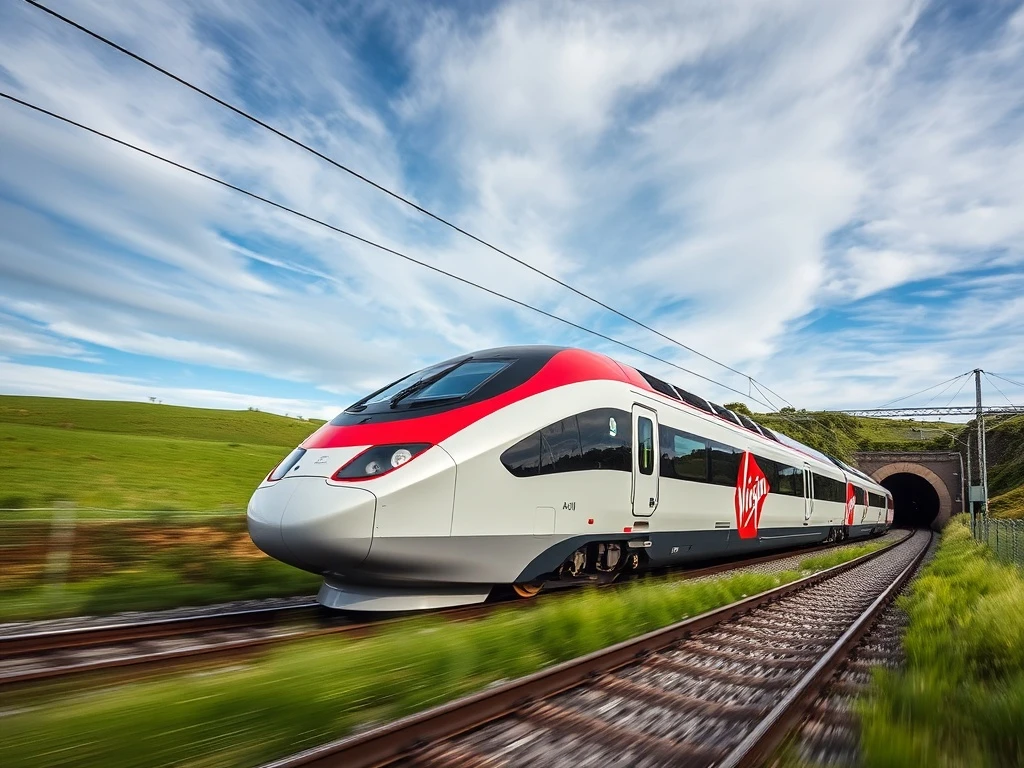A new era for cross-Channel rail travel appears on the horizon. Virgin Trains has announced a bold return to the European rail market. This significant move directly challenges Eurostar’s long-standing dominance. The company aims to launch services from 2030, promising a fresh competitive landscape. This development holds major implications for business travelers and tourists alike. Indeed, it could redefine how millions journey across Europe.
Virgin Trains’ Ambitious Plan Takes Shape
Virgin Trains has finalized a pivotal deal with French manufacturer Alstom. This agreement secures 12 new high-speed trains. These vehicles will form the backbone of Virgin’s planned cross-Channel operations. The company’s submission to the Office of Rail and Road (ORR) confirms this strategic acquisition. Furthermore, Virgin has secured binding exclusivity for the Avelia Stream model. This represents the latest generation of Alstom’s renowned Pendolino tilting trains. Virgin introduced similar Pendolino trains to the UK’s West Coast Main Line two decades ago. Notably, identical trains currently operate successfully in Sweden and Italy, proving their reliability and performance.
Virgin’s proposal outlines specific routes. Services will connect London St Pancras to major European cities. These include Paris, Brussels, and Amsterdam. Longer-term ambitions also exist. The company hopes to extend its network further into France, Germany, and Switzerland. Phil Whittingham, former boss of Virgin Trains UK, will lead this venture. His extensive experience in the rail sector provides strong leadership. This commitment underscores Virgin’s serious intent to disrupt the market. Consequently, travelers could soon enjoy more choices.
Securing Financial Foundations for Virgin Trains’ Venture
Establishing a new international rail service requires substantial capital. Virgin’s plan requires approximately £700 million in investment. The company has structured its funding strategically. A 50% stake will be held by Virgin itself. Two undisclosed institutional shareholders will provide the remaining capital. This robust financial backing is crucial for such a large-scale project. Virgin asserts it is the only current applicant with both funding and trains secured. This unique position provides a significant advantage in the competitive application process. The venture also envisages separate operating and rolling stock asset-holding companies. This structure aims to optimize efficiency and asset management.
This financial commitment highlights the seriousness of Virgin’s challenge. It demonstrates a clear path to market entry. The capital will cover train procurement, operational setup, and initial marketing efforts. Moreover, securing the Alstom trains early minimizes procurement risks. This forward-thinking approach positions Virgin Trains strongly against potential rivals. Their clear financial roadmap also builds trust with regulators and potential partners. Ultimately, this funding is essential for success.
Intensifying Competition in Cross-Channel Rail
The Office of Rail and Road (ORR) plays a pivotal role in this process. It currently reviews multiple applications for Channel Tunnel passenger services. Competition for market entry is indeed mounting. Italy’s state-owned railway, Trenitalia, has also submitted an application. Additionally, UK start-up Gemini is vying for approval. The ORR’s assessment considers various factors. These include financial viability, operational plans, and benefits to consumers. The entry of multiple players could fundamentally reshape the market. It moves away from Eurostar’s decades-long monopoly.
This increased competition promises benefits for passengers. More operators often lead to improved services and competitive pricing. Historically, monopolies can result in limited choices. They may also offer less innovation. The ORR’s approval process ensures fair competition. It also guarantees high safety standards. The potential arrival of Virgin Trains and others signals a dynamic shift. Travelers could soon enjoy more options for European journeys. This competition ultimately drives progress within the industry. Consequently, consumer choice should expand.
Sir Richard Branson’s Vision for Virgin Trains
Sir Richard Branson, Virgin founder, has publicly championed this initiative. Writing in The Times, he articulated his primary aim: to inject vital competition. He also seeks to significantly improve the passenger experience. Branson stated, “For too long, passengers have had no choice and even less joy.” This statement underscores his motivation. Virgin’s approach, he explained, is not about imitation. “We’re not here to copy. We’re here to raise standards, spark innovation and give people a better way to travel.”
Branson’s vision aligns with Virgin’s brand philosophy. The company consistently emphasizes customer service and innovation. This ethos aims to differentiate Virgin’s offering. Their return to rail signifies a commitment to this vision. It also reflects a belief in the untapped potential of the cross-Channel market. The emphasis on ‘joy’ and ‘better way to travel’ resonates with consumers. It sets a high bar for future service delivery. This bold statement reinforces Virgin Trains‘ commitment to transforming European rail travel. Therefore, expectations are high.
The Eurostar Dominance and Future Landscape
Eurostar has dominated the Channel Tunnel passenger market since 1994. Its operations have been largely unchallenged for nearly three decades. Virgin’s proposed services would mark the first significant competitive threat. This potential shift could redefine cross-Channel travel. The market has grown considerably since Eurostar’s inception. Demand for fast, efficient rail links between the UK and mainland Europe remains strong. However, competition could lead to significant changes.
Increased choice could pressure Eurostar to innovate. It might also encourage more competitive pricing strategies. Passengers could benefit from a wider range of service levels. They may also see more frequent departures. Challenges for new entrants remain, however. Securing track access, managing international logistics, and building brand awareness are key hurdles. Ultimately, the ORR’s decision will shape the future of this vital transport corridor. The prospect of multiple high-speed rail operators promises an exciting future for European travel. The return of Virgin Trains is certainly a game-changer.
FAQs About Virgin Trains’ Cross-Channel Bid
When will Virgin Trains services start?
Virgin Trains aims to launch its cross-Channel services from 2030, pending regulatory approval from the Office of Rail and Road (ORR).
Which routes will Virgin Trains operate?
Initially, Virgin Trains plans to operate services from London St Pancras to Paris, Brussels, and Amsterdam. The company also holds longer-term ambitions to extend routes into France, Germany, and Switzerland.
Who is funding Virgin Trains’ new venture?
The venture requires approximately £700 million in capital. Virgin holds a 50% stake, with the remaining funding provided by two undisclosed institutional shareholders.
What type of trains will Virgin Trains use?
Virgin Trains has ordered 12 new high-speed trains from French manufacturer Alstom. These will be the Avelia Stream model, which is the latest generation of the Pendolino tilting trains.
How will this affect Eurostar?
Virgin Trains’ entry marks the first significant challenge to Eurostar’s dominance since 1994. Increased competition could lead to more competitive pricing, improved services, and greater choice for passengers.
What is the ORR’s role in this process?
The Office of Rail and Road (ORR) is the UK’s independent rail regulator. It is currently reviewing applications from Virgin Trains and other companies. The ORR’s approval is essential for new operators to enter the Channel Tunnel passenger market.






